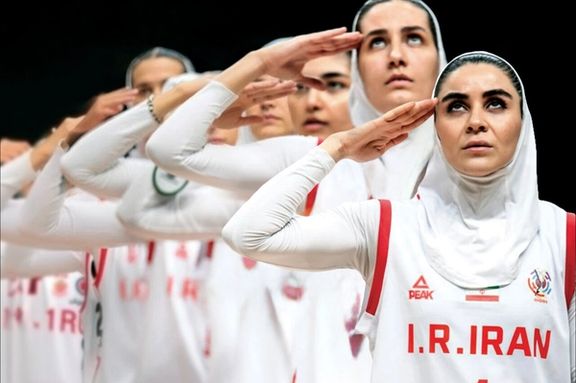Salutes and anthems: how sports succumbed to Iran's culture war

Iranian athletes competing abroad face conflicting pressures: the state demands public displays of loyalty, while opponents expect defiance.

Iranian athletes competing abroad face conflicting pressures: the state demands public displays of loyalty, while opponents expect defiance.
Since the 12-day war with Israel in June, athletes have been performing military-style salutes to the flag at international competitions—a move heavily promoted by state media but denounced by opposition groups and angry fans.
The first instance came on June 14, a day after Israel’s strikes, when Iran’s volleyball team saluted before a match in the FIVB Men’s Nations League.
Whether the move was spontaneous or ordered by authorities remains unclear. Since then, athletes at send-off ceremonies, matches and even homecomings are expected to perform the gesture.
Opponents condemn what they see as forced reverence for the flag and anthem, symbols they see as inseparable from the Islamic Republic’s ideology.
Refusal to sing the anthem had become one of the most visible forms of athlete protest in recent years.
State media, including Press TV, portray the salutes as loyalty to the armed forces and solidarity with war victims.
Following the June conflict with Israel and the United States, authorities have embraced a nationalism they once suppressed to rally a weary public. Sports are now used to showcase allegiance.
“This gesture shows our enemies that the nation always stands behind the Leader of the Revolution,” said MP Rahim Zare, praising the footballers’ salute before a CAFA Nations Cup match against India.
Opponents, however, slammed the display and even celebrated the team’s defeat online.
“These are the regime’s team,” one X user wrote. “It used to be the national team when it didn’t give military salutes.”
Football’s loss of support
The national football team, Team Melli, has suffered a dramatic loss of support since the 2022–23 protests triggered by Mahsa Amini’s death in custody.
Some players condemned the crackdown, wore black armbands, and refused to sing the anthem at the Qatar World Cup. Their defiance drew global attention but was followed by a return to compliance, reflecting intense behind-the-scenes pressure.
Many fans began calling the squad the “mullahs’ team.” Victories no longer stirred pride; defeats—such as the Asian Cup loss to Qatar in February 2024—were even welcomed by some.
Pressure beyond football
The football squad’s experience is emblematic, but pressure extends across sports. Athletes risk harassment, arrest and career ruin for small acts of defiance.
Voria Ghafouri, captain of Esteghlal, was arrested in November 2022 after criticizing the government’s protest crackdown and supporting Kurdish rights. His career has since collapsed.
Legendary striker Ali Daei and his family were also targeted: his Tehran businesses were shut, and authorities forced a jetliner to land to stop his family from leaving the country.
Images from a charity match last week showed Daei and fellow former player Hamid Estili refusing to sing the anthem—a quiet but potent reminder that, even under relentless pressure, the anthem remains one of the few remaining stages for resistance.